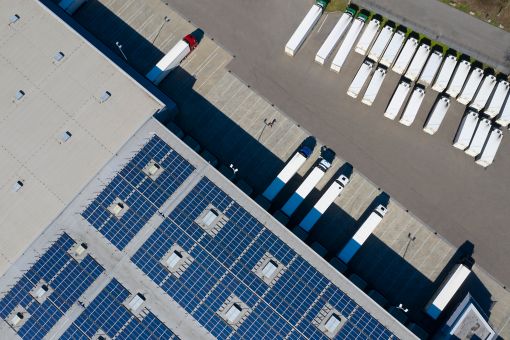At KPMG, we acknowledge that climate change is the greatest challenge of our time.
Many companies are leading the way with ambitious plans to reduce co2 emissions in the atmosphere, strengthen biodiversity, counteract discrimination and ensure good conditions and frameworks for the business operations that ensure the prosperity and development of our society.
At KPMG, we want to contribute to that work, both by helping our clients develop their initiatives, and of course also by contributing to the development itself. We have therefore launched an ambitious plan with the aim of contributing to the green transition - not only by working with compliance and reporting, but also by creating real change. This means that we dare to question our own way of doing things, just as it requires that we, together with our clients, challenge each other and seek other opportunities than those we have traditionally strived for.
How do we work with ESG?
To mitigate the worst effects of climate change, we will put our entire business into play to ensure the best and widest comprehensive services for our clients. We do not believe in having a team that works with sustainability. Our goal is that all our employees have a knowledge of the subject and that everyone can contribute to ensuring the sustainable transformation of our clients and ourselves. We want to embed ESG in everything we do, and we believe it can create a strong foundation for our future business.
We have a global reach and we can contribute to the development in all areas and in all markets, from audit to energy to strategy and innovative technological solutions based on AI and quantum technology.
We see that companies and business leaders are increasingly being held accountable for both social and environmental impacts, whether they are positive or negative. Everything from authorities, investors to customers and employees assess a company's performance, and the consequences of this assessment ultimately have an impact on whether you can run a profitable business. We do not believe that it’s a choice whether you want to be part of the green transition or not. We are certain that this is something you have to do, both because it is the right thing to do and also because as a company you will not be able to survive if you do not contribute to a positive change as much as you possibly can.
Our mission is to translate knowledge and understanding of information, industries and business trends into value for our clients, our employees and the capital markets.
Our team of Sustainability Advisors work both to ensure our own internal transformation, just as they help companies create real change based on data.
Frequently asked questions
ESG is a sustainability framework that works to integrate environmental, social and governance factors – both risks and opportunities, into an organisation’s strategy to build long-term sustainability and value creation. ESG strategies can help companies achieve long-term sustainability, drive economic vibrancy, and deliver long-term value through effective engagement with stakeholders.
Environmental
The environmental factor in ESG, considers a company’s responsibility towards the environment, herein factors such as; energy use, greenhouse gas emissions, pollution, waste generation, impact on biodiversity, and use of natural resource are often considered.
Social
The social factor in ESG examines how well a company manages relationships with employees, suppliers, customers, and the community. Herein, areas that are often considered are; Diversion, Equity and Inclusion, human- and labor rights, health and safety, as well as customer data and privacy.
Governance
The governance factor in ESG is concerned with how a company manages itself. Governance factors often considers leadership, internal controls, executive pay, audits, and shareholder rights, and focus on risks within areas of; compliance with accounting standards, tax, whistleblower mechanism, and bribery and corruption.
Investors increasingly expect transparent reporting aligned to industry ESG standards to help companies engage with their stakeholders and communicate ESG performance consistently and transparently.
ESG criteria includes a wide range of non-financial scoring categories, used by investors and other stakeholders to assess the impact of a company’s products and business practices on sustainability and social causes. It is therefore important for organisations to consider how to best perform on these scores.
Similarly, there is an increased societal awareness of the ESG responsibility of organization when it comes to monitoring their own impact on the environment, social and governance factors. Meeting this societal awareness with a strong ESG proposition and strategy can increase an organsiations brand awareness, brand rating, consumer loyalty, and employee retention.
We can help you tailor your ESG strategy to the risks, realities, and ambitions of your business and help you build an ESG solution tailored to your strategic sustainability journey.
ESG is the abbreviation for Environmental, Social and Governance, and thereby focuses on the actions that a company is undertaking within these areas. It should hence be understood as a framework that allows organisations to work more comprehensively with sustainability.
CSR is short for Corporate Social Responsibility and can be described as a business model where companies put focus on the impact they are having on wider society. This also includes the environment and people in society.
ESG and CSR are both concerned with the impact a company has on the environment and society. The difference is, however, that CSR is a business model used by companies, whereas ESG is a criteria that investors use to assess a company and whether they should invest or not. CSR can be thought of as more qualitative and can be incorporated by communicating internally and externally that a company is committed to being more sustainable and responsible.
ESG is on the other hand more quantitative, as it builds on measurable goals such as a committing to net zero before 2030, and is being centered through new EU directives, such as the CSRD that requires organisations to report on ESG.
Our areas of expertise
Contact us and read more insights here
Michael B. Jensen
Partner, Head of Products & ESG
KPMG in Denmark













